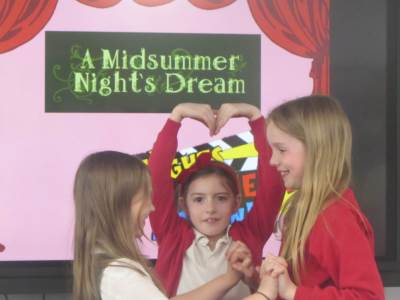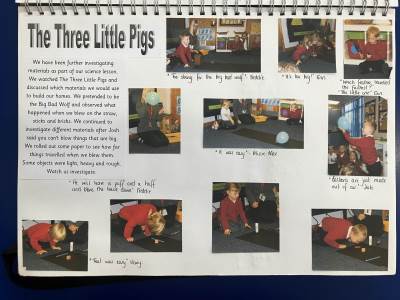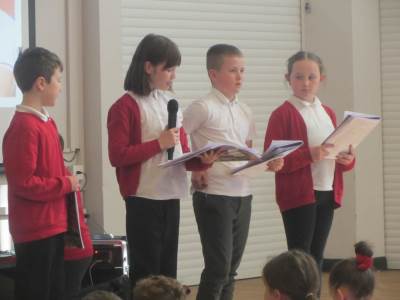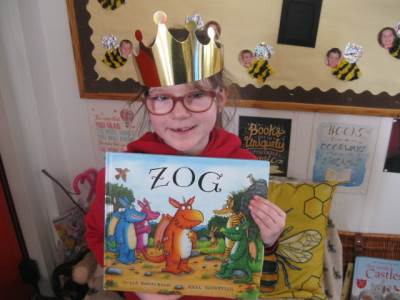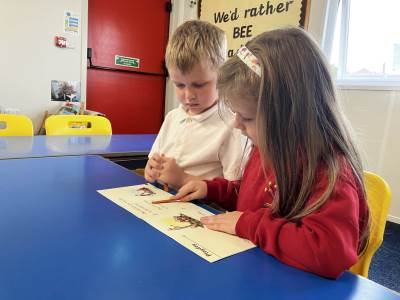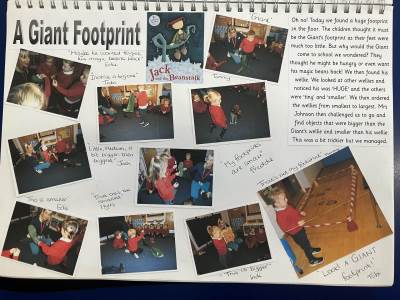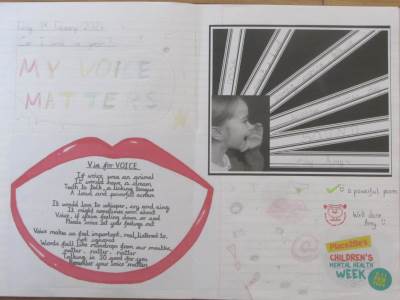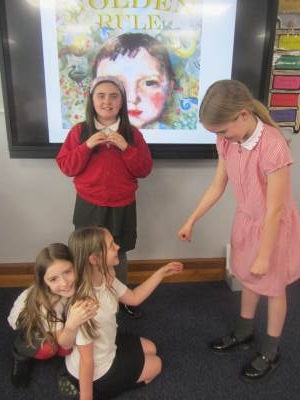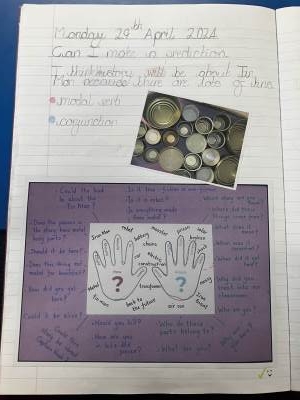English
'There is more treasure in books than in all the pirate's loot on Treasure Island.' Walt Disney
At Biddick Primary School, we want our children to develop a love for language through the spoken and written word.
- We are committed to nurturing: confident speakers, who can express themselves and communicate with others effectively; enthusiastic readers, who love books and read a range of texts with confidence, accuracy, fluency and understanding – for pleasure and for information; skillful writers, who can write in a range of styles appropriate to the audience and purpose.
- We want to develop our children’s understanding of Speaking, Listening, Reading and Writing and provide them with the opportunities to apply and reinforce their skills in English lessons and across other curricular areas.
- We inspire children to write imaginatively, accurately and purposefully, focusing on the ability to adapt their language, vocabulary and style through a range of contexts.
Our English curriculum is centered around high-quality texts to inspire and engage and we believe that a secure base of English skills is crucial to a high-quality education and will provide our children with the tools they need to thrive.
Oracy
We place great emphasis on developing confident, articulate speakers, who can listen to and understand others. We promote classrooms rich in talk, where questions are planned, conversations are modelled and teachers use talk to skilfully develop thinking. Our lessons in all subjects are designed to support children’s speaking and listening skills by including opportunities for discussion, debate, explanation and presentation to an audience. Reading and writing ‘float on a sea of talk’ and developing a wide vocabulary is a key element of this. When we plan our teaching, we are conscious of the new words, phrases and concepts that children need in order to really understand a new topic and be able to explain their learning.
Reading
We are passionate about developing a love of reading and approach it in a wide range of ways in order to ensure that no child misses out on the pleasure of books. Our curriculum is crafted around high-quality texts, each one specifically chosen to bring learning to life, inspire young readers and writers and expand their horizons. Based on the belief that there is a book out there for everyone, children will find a diverse selection of fiction and non-fiction texts in our reading hubs that will appeal to their wide-ranging interests.
Reading is at the heart of learning and we strive to ensure that every child becomes a keen and confident reader; leaving us at the end of Year 6 equipped to meet the challenges of an ever-changing world. In Reception and Key Stage 1, we use the RWI phonics scheme to support reading development. This scheme includes a progression of books, which are closely linked to their phonics knowledge to ensure steady progress. Reading sessions with the teacher focus on practising early reading skills and comprehension of carefully chosen texts. This is supplemented by shared and modelled reading, where the teacher demonstrates key strategies and explains their thinking about vocabulary, author’s intent, and the purpose and meaning of the texts.
In Key Stage 2, we provide a range of banded books for children where needed, alongside children’s choices of books. Children have a daily whole-class reading lesson, focusing on skills such as retrieval of information, summarising, expanding vocabulary, and explaining their understanding of the text. Additional support with reading is provided for those children who need it. We regularly read stories in assembly and we contact authors and poets for visits, input and conversations about their books.
Our children read widely and often, which supports them in their understanding of concepts across the curriculum. The vast majority of children enter Key Stage Two as independent readers, ready to be exposed to a rich menu of books on offer. The whole school environment is adorned with high quality texts in classrooms, in corridors and in an array of book nooks around school. We run a Free to Read session each week, where children spend time discovering and sharing books. Buzz and Bug books are used to provide opportunities for children to become life-long readers and value the importance of reading in their everyday lives.
Writing
We aim to create an environment, in which writing is valued, celebrated and every child is encouraged to see themselves as a writer. We encourage even our youngest children to engage in purposeful writing - writing letters, making cards, recipes, lists and notices and telling stories, which are scribed by adults until the children are ready to take over the task of writing for themselves. In Early Years and Key Stage 1, our play-based provision ensures that children use their developing writing skills for a range of purposes linked to the things that motivate and interest them: making information books about dinosaurs or recipes that they have followed, letters, notes, lists and poems. We find that, when children are not ‘made’ to write, they want to write more. We teach young children correct letter formation and handwriting from the very beginning, moving on to important skills like using ‘finger spaces’, re-reading for sense, as well as editing and correcting. They then apply these skills in their freely-chosen writing, as well as in adult-led writing tasks.
In daily English lessons, we take a carefully selected text approach to the teaching of writing: high quality texts provide the starting points for the writing journey with progression across a range of genres mapped across the curriculum; allowing children to activate prior knowledge and create links between experiences. Writing is taught through a combination of modelled, shared and guided writing which serve to provide a context for discussion and demonstration of grammatical features at word level, sentence level and text level. Activities are scaffolded through the use of writing frames, spelling banks, collaborative work and peer or adult support to allow all children to make good progress from their starting points. As in the teaching of reading, talk is seen as an integral part of the writing process; providing children with the opportunity to develop the confidence to question and challenge and develop and broaden their vocabulary.
Opportunities for independent writing are woven throughout a writing unit and across the wider curriculum; allowing children the chance to practise taught skills and develop and express their ideas in a range of different contexts. When editing writing, children are encouraged to learn from their mistakes and build on successes so that they may develop as independent, confident, successful learners.
english in eyfs curriculum.pdf
Phonics
Our phonics programme gets our children off to a flying start with their reading and writing. The Read Write Inc programme is a method of learning, centred around letter sounds and phonics. Children in EYFS and Key Stage One, will develop their recognition of the 44 phonemes in the English Language (represented by the 26 letters of the alphabet) the building blocks to making them confident with reading and spelling. Reading opens the door to learning. A child who reads a lot will become a good reader. A good reader will be able to read more challenging material. A child who reads challenging material is a child who will learn. The more a child learns, the more he or she will want to find out. The teaching of reading begins by helping children tune into the sounds around them and develop awareness that letters represent sounds which go together to make words. Phonics is delivered by trained staff daily, with children grouped appropriately to ensure maximum progress. Once children are confident and have completed the Phonics Programme there is a natural transition to the Read Write Inc Spelling Programme which continues into Key Stage Two until children have completed units successfully and with confidence.
Spelling
Spelling enables our children to draw upon their phonic knowledge, learned rules and patterns and become confident word builders. From Year 2-6 children learn to develop their spelling skills using the Read, Write, Inc. Spelling scheme. Children focus on one spelling pattern, or rule, for a number of sessions and develop their confidence and understanding of the words along the way. Each unit follows the same pattern, allowing the children to focus solely on learning and understanding the spellings rather than learn how to do new activities.
They will not bring home a generic list of spellings to learn each week for a spelling test, as research has shown this is not an effective way to embed spelling knowledge. Instead, they will identify their own words to log and learn weekly and have opportunities to test their growing spelling abilities in every lesson. In addition, children are taught the words from the statutory list from the National Curriculum. These are called orange words in RWI Spelling. The word-lists for years 3 and 4 and years 5 and 6 are a mixture of words pupils frequently use in their writing and those which they often misspell.
Handwriting
We take great pride in our presentation and handwriting. Using the Nelson Scheme, children are taught correct letter formation from the very beginning, starting with drawing and painting shapes and patterns on large sheets of paper, then using plain paper to write letters, before moving onto lined exercise books by Year 1. The joining of letters starts to be taught in Year 2. In KS2, we continue to use the same scheme and all classes will have at least two short handwriting sessions a week. For children who require extra support, we provide regular, short interventions and appropriate writing tools and resources. Teachers themselves model correct handwriting in and around the classroom, to ensure consistency and high expectations. All children are expected to use joined, legible writing by Year 6.
Grammar and Punctuation
Correct grammar and punctuation are integral to successful reading and writing. We look at grammar within the context of texts we are reading, where we consider the impact of an author’s word choice and sentence structure. Grammatical terms and punctuation are taught progressively, and revisited often, in order to develop and improve children’s writing. As children’s ideas and ambitions become more sophisticated, they are taught to use a wider range of sentence structures and the appropriate punctuation to add emphasis, to represent speech and to create tension or humour.




